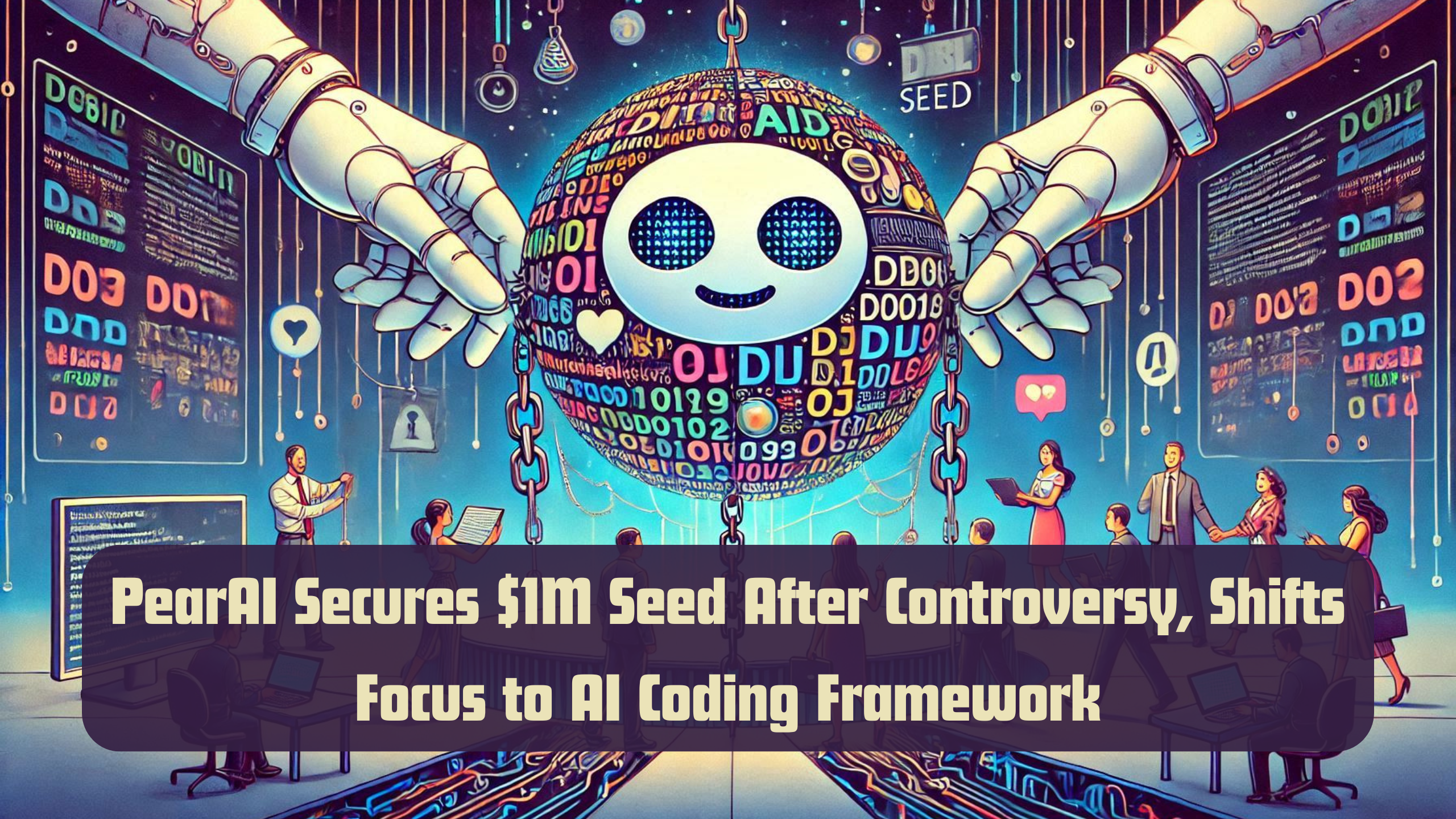PearAI, a startup initially launched during Y Combinator’s winter 2024 session, faced significant backlash on its first day, leading to online outrage and accusations of copying another open-source code editor. However, after surviving the criticism and refining its product, PearAI has managed to secure $1 million in seed funding, bringing its total funding to $1.25 million, including Y Combinator’s standard $375,000 deal.

Backlash and Initial Product Launch
On the first day of Y Combinator’s winter 2024 session, PearAI founders Nang Ang and Duke Pan launched a minimal viable product (MVP) of their AI code editor on GitHub. The launch included a high-profile tweet and a YouTube video, leveraging the founders’ previous YouTube presence. However, the backlash was swift. Within hours of release, accusations surfaced that PearAI had essentially copied the open-source code editor, Continue, with minor changes and removed Continue’s name to insert their own. Furthermore, their use of a non-standard, GPT-generated license sparked significant outrage in the open-source community, who viewed it as a direct affront to open-source principles.
Ang later acknowledged that licensing issues had been addressed, but the damage was done. The situation escalated further when Pan posted a tweet boasting about quitting his high-paying job at Coinbase to work on PearAI, claiming the product was already superior to GitHub Copilot. This bold statement further enraged critics and drew attention from Continue, a fellow Y Combinator company, who criticized PearAI.
Amidst the public outcry, YC CEO Garry Tan stepped in to defend the founders, emphasizing that the situation was part of a learning process for early-stage startups.
Also Read: New Anthropic Study Unveils AI Models’ Deceptive Alignment Strategies
Product Pivot: From Code Editor to AI Framework
By Sunday, PearAI had recognized that the backlash stemmed from their perceived attempt to enter an oversaturated market of code editors. Ang and Pan decided to pivot their product strategy based on feedback, focusing instead on building an AI framework that integrates multiple AI coding tools.
Nang Ang explained, “We love coding, and we want to see it done better. The feedback from the community showed there might not be room for another code editor, but there is definitely space for a tool that curates AI coding tools and allows them to work together seamlessly.”
The new product concept focuses on a backend framework that connects AI tools, enabling programmers to access various coding tools through a unified interface. This ensures a smooth and cohesive user experience, making it appear as if users are interacting with a single product instead of multiple AI tools. The framework integrates with tools like Continue and others, addressing the core issue raised by critics.
Also Read: Study Highlights AI Cognitive Decline in Clinical Applications
Seed Funding and Investor Interest
Despite the rocky start, PearAI’s new direction has resonated with investors. Seed round investors include prominent firms like Goodwater Capital, Multimodal Ventures, Orange Fund, and Exitfund, alongside several unnamed angel investors. The $1 million raised, plus the Y Combinator funding, gives PearAI the capital to refine and scale their new AI framework vision.
“This funding will allow us to further develop our framework, enhance the user experience, and ensure we build something truly valuable for the programming community,” Ang said.
Also Read: AI Agents: The Next Frontier in Artificial Intelligence Tools
Lessons from the Backlash
The PearAI founders have learned valuable lessons from the backlash, especially regarding open-source licensing and the importance of transparency. Ang reflected, “We’ve become much more aware of how our actions impact the community and how essential it is to build responsibly.”
The experience has shaped their approach, emphasizing collaboration, community feedback, and adaptability in the fast-moving world of AI and tech development.
Also Read: Can Memory Technologies Solve AI’s Growing Energy Problem?
Conclusion
PearAI’s journey from controversy to funding highlights the challenges faced by startups in today’s highly competitive and scrutinized tech landscape. By listening to feedback and adjusting their approach, PearAI has shifted from a potential PR disaster to a promising player in the AI coding space. The startup’s focus on a unified AI framework could address longstanding issues in the industry, paving the way for future growth and success.
FAQs
- What sparked the initial backlash for PearAI?
The backlash was sparked by accusations of copying another open-source code editor, Continue, and using a non-standard GPT-generated license. - How much funding did PearAI raise?
PearAI secured $1 million in seed funding, plus $375,000 from Y Combinator. - What was PearAI’s initial product?
PearAI initially launched an AI code editor, but later pivoted to a framework integrating multiple AI coding tools. - Who defended PearAI during the controversy?
YC CEO Garry Tan defended PearAI, acknowledging the learning process for early-stage startups. - What is PearAI’s new product focus?
PearAI now focuses on a backend framework that curates and integrates multiple AI coding tools into a unified interface. - Which investors backed PearAI’s seed funding?
Investors include Goodwater Capital, Multimodal Ventures, Orange Fund, Exitfund, and angel investors. - How did PearAI address open-source licensing concerns?
PearAI resolved licensing issues by adopting standard open-source licenses and better documenting their work. - Why did PearAI pivot from a code editor to a framework?
PearAI realized the market for standalone code editors was saturated, leading them to focus on a more integrated solution. - What lessons did PearAI founders learn from the backlash?
They learned the importance of transparency, responsible open-source practices, and community feedback. - What is PearAI’s vision moving forward?
PearAI aims to create a framework that seamlessly integrates AI coding tools, offering a cohesive user experience.

